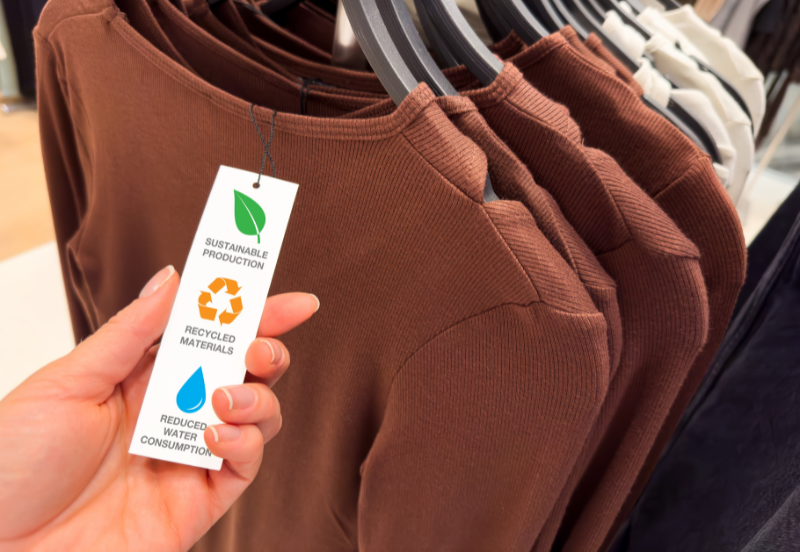growth strategies
Black Friday and Cyber Monday: 13 Tips to be Sustainable, Mindful (and Demure) This Shopping Season
By: Niyati Budhiraja
Social and Community Engagement Specialist
October 17, 2024
 Calculating time...
Calculating time...

Black Friday Cyber Monday (BFCM), the annual shopping extravaganza, has traditionally been synonymous with consumerism and materialism. However, a growing movement is challenging this notion: conscious consumerism. This trend is characterized by consumers who prioritize ethical, sustainable, and socially responsible choices in their purchases.
In recent years, a noticeable shift has occurred in BFCM shopping and consumers are more intentional than ever when it comes to making sustainable choices.

Did you know more than 80% of consumers are willing to pay a higher price for products that are sustainably produced or sourced? On average, consumers are prepared to pay a premium of 9.7% for goods that meet specific environmental standards. These standards include products that are locally sourced, made from recycled or eco-friendly materials, or produced using a supply chain with a reduced carbon footprint.1
Consumers are becoming more aware of the environmental and social impacts of their purchases and they’re not afraid to ask retailers tough questions about
- Sustainability: Are the products made from eco-friendly materials?
- Fair trade: Are the products produced under ethical conditions?
- Social responsibility: Does the company support positive social causes?
This growing consciousness has led to a surge in demand for sustainable and ethical products, even during the traditionally consumerist BFCM season.
Here are some ideas to help your business to be more mindful (and demure) this shopping season:
1. Prioritize Sustainability:
-
Clearly communicate your brand's commitment to eco-friendly practices: Make sustainability a core part of your brand identity. Use clear and concise language on your website, social media, and marketing materials to convey your dedication to environmental responsibility. For example, you could highlight your use of recycled materials, energy-efficient production processes, or fair labor practices.
-
Use sustainable materials: Choose materials that have a lower environmental impact, such as organic cotton, recycled polyester, or bamboo. This demonstrates your commitment to reducing resource consumption and minimizing pollution.
-
Minimize your carbon footprint: Take steps to reduce your company's carbon emissions, such as using renewable energy, optimizing transportation routes, or investing in carbon offset programs.
Example: A fashion brand could emphasize their use of organic cotton and recycled materials, as well as their commitment to ethical sourcing and production.

2. Tell Your Brand Story:
-
Highlight the ethical and sustainable practices: Emphasize the positive social and environmental impacts of your products. This could include supporting local communities, protecting biodiversity, or reducing water consumption.
-
Use storytelling to connect with consumers: Create compelling narratives that resonate with your target audience. Share personal stories, case studies, or behind-the-scenes glimpses of your business to foster a deeper connection.
Example: A coffee company could share the story of their coffee farmers and the impact their fair-trade practices have on their communities.
3. Educate Your Customers:
-
Provide information about your products' environmental and social impacts: Share data and certifications that demonstrate the sustainability of your products. This could include information about materials used, energy consumption, or fair labour practices.
-
Create educational content: Develop blog posts, videos, or social media content that educates consumers about sustainability and environmental issues. This can help raise awareness and inspire positive change.
Examples: A fashion brand could offer tips on how to care for their clothing to extend its lifespan and reduce waste. A home goods company could create a blog series on eco-friendly home decor tips and sustainable living practices.
4. Reduce, Reuse, Recycle
-
Opt for recycled or biodegradable materials: When creating marketing materials, such as catalogs, flyers, and packaging, choose materials that have a lower environmental impact. Recycled paper, soy-based inks, and biodegradable plastics are all great options.
-
Reduce waste: Implement practices to minimize waste throughout your production and packaging processes. This could involve using recyclable or compostable materials, optimizing packaging sizes, bulk packaging, eliminating unnecessary elements or donating excess inventory.
-
Provide incentives for customers to recycle or return old products: Offer discounts, rewards, or loyalty points to customers who recycle or return their old products. This can encourage sustainable practices and help to reduce waste.
Examples: A cosmetic brand could use glass bottles for their products instead of plastic tubes. A coffee company could offer customers a discount on their next purchase if they return their reusable coffee cups.
5. Collaborate with Eco-Friendly Brands:
Example: A fashion brand could partner with an eco-friendly skincare company to offer a gift set that includes clothing and beauty products made from organic materials.
6. Support Local Artisans:
Example: A local food market could partner with farmers and producers in the region to offer fresh, locally sourced produce and other products.
7. Donate to Environmental Causes:
Examples: A home goods brand could donate a percentage of their BFCM sales to a reforestation organization or a charity that focuses on ocean conservation. A retail store could offer customers the option to donate a portion of their purchase to a local environmental organization.
8. Limit Discounts:
-
Focus on quality and value over excessive discounts: Instead of relying heavily on discounts, emphasize the quality, durability, and ethical production of your products. This can help shift the focus away from consumerism and towards sustainable and responsible shopping.
Example: A maker could create marketing materials that emphasize the craftsmanship of your products. If discounts are important for your business during the holidays, you could offer a discount on a single item per purchase, once per customer.
9. Offer Experiences:
-
Provide unique experiences or workshops related to your products: This can create a more engaging and memorable shopping experience for your customers. It can also help to educate them about your products and their sustainability benefits. By providing unique experiences, you can create a stronger connection with your customers and build brand loyalty.
Example: A skincare brand could offer workshops on natural beauty routines or DIY skincare products.
10. Encourage Mindful Shopping:
-
Provide resources and information: Offer resources and information to help customers make informed decisions. This could include information on product sustainability, care instructions, or recycling options.
Example: A clothing brand could create a blog post or social media campaign that encourages customers to consider a capsule wardrobe and make thoughtful purchases.

11. Leverage Social Media:
-
Share inspiring stories, tips for sustainable living, and behind-the-scenes glimpses of your sustainable practices: Use social media to connect with your customers and share your brand's commitment to sustainability. This can help to build a community of like-minded individuals who are passionate about environmental issues.
12. Offer Repair Services:
Example: A footwear company could offer a repair service for damaged or worn-out shoes. A sustainable fashion brand could create a blog post or social media campaign highlighting the importance of repairing clothes and reducing waste.
3. Create a Community:
-
Foster a sense of belonging among your customers through sustainable initiatives: Organize community events, online forums, or social media groups where customers can connect, share experiences, and learn about sustainability.
Example: A fashion retailer can provide a platform where customers can discuss sustainable fashion tips and ask questions about ethical clothing production.
As the world becomes increasingly aware of the environmental impact of consumerism, it's essential for brands to rethink their approach to Black Friday and Cyber Monday. By prioritizing sustainability, ethical practices, and giving back to the community, your business can not only contribute to a healthier planet but also build stronger relationships with your customers.
A sustainable Black Friday is not just a trend; it's an important step towards a more responsible and sustainable future.
_______________________________________________________________________
Author Profile
Niyati Budhiraja
Social and Community Engagement Specialist
Niyati Budhiraja is a word nerd who turns tricky business talk into fun, simple and genuinely helpful content. She writes features on inspiring Canadian businesses, crafts easy-to-follow guides and shares smart tips to help small businesses feel confident and supported. When she’s not writing or dreaming up her next blog idea, you’ll likely find her hunting down the city’s best hot chocolate.











